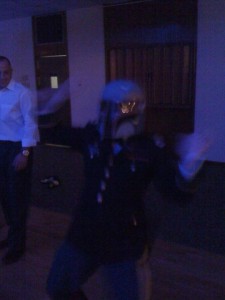If you wanted to, you could spend your entire Army career on a military installation without venturing into the civilian world. There is such an insulation between military personnel and the civilian world, that it is easy to lose sight of it if you are not careful. You can live on post whether you are married or single. To get to work you do not even need to leave post. You get your groceries at the commissary. You get your furniture at the PX. Haircuts, restaurants and movie theaters are all on post. Heck they even have Game Stops at most PX’s and there are even food courts in there. This is a good thing or a bad thing dependent on your view of the Army, but it can wear on you. Army 24/7, if you want time away sometimes it can be hard to escape.
Language: The military has it’s own language. Well maybe not it’s own language, but it’s own terminology, acronyms and phrases. Only Soldiers can drop the F bomb into normal conversation and the service members around him not bat an eye. “Did you get that f*cking, email? That mother f*cking f*ck stick doesn’t know his a*s from his elbow.”
You also hear a litany of acronyms that everyone is suppose to know: TCP (Traffic Control Point), EOD (Explosive Ordinance Disposal), OER (Officer Evaluation Report), and ERB (Enlisted Record Brief) are some common ones. Some of the fun ones are: POG (Person Other than Grunt), and DICK (Dedicated Infantry Combat Killer). BF is not your boyfriend or your best friend. BF is known as a Blue Falcon, or Buddy F*cker, which you call someone that screws you over.
Ritual: We have ceremonies for everything. My unit has an award ceremony every month, which gives awards to Soldiers who do outstanding work, or people that are leaving the unit. There are Change of Command Ceremonies(CoC for short, “did you see that CoC?” “Yeah, that CoC was pretty big”). These occur when the commander is leaving and another one is taking his place. Promotion ceremonies happen every time someone gets promoted, and is usually done in front of the Soldier’s unit. Then there are ceremonies that center around a holiday like Tree Lightings for Christmas, and Veteran’s Day ceremonies that honor fellow Soldiers.

Boba Fett is busting a move in his dress uniform
Clothing: Obviously we wear a uniform. It helps us and others distinguish each other from normal civilians and military service members. It helps form unity and patriotism, especially since we wear the American flag on our right shoulder. It also lets us easily identify each other, since our name tags are all on the right side of our chest, and our branch is on the left side (over our heart). Uniforms are worn during the duty day (normal 9 to 5 work hours) and during special occasions when we wear a dress uniform.
History: Part of what makes a distinctive culture is a shared history. The military definitely has that, especially the Army. The US Army has been around since 14 June 1775 and is the oldest branch of the US military. All units also have their own history. Some of which stretches to the before the War of 1812. The 3rd U.S. Infantry Regiment, also known as The Old Guard, was established in 1784 and is the oldest active duty regiment in the US Army. This history helps establish a brotherhood with those who went before us, and those that will come after. It helps us keep our traditions alive and it is something most in the civilian world do not understand, and cannot understand about the military.
Social Norms: Dark humor is huge in the Army, and quite normal. On deployments some of the only ways to deal with a tough situation is to joke about it. In the words of one NCO: “After the 7th time getting blown up, you couldn’t help but laugh about it. 7 times and those f*ckers still couldn’t kill us.” We used to joke around about how it wouldn’t be bad to die in a Scud attack because you wouldn’t feel anything. Things normal people don’t joke about Soldiers joke about to pass the time and get through the tough times. On the other side of it, Soldiers are usually much more polite than your normal civilian. They hold doors, say the greeting of the day (like good morning), and say please and thank you. They render salutes to officers and acknowledge NCO’s. In an outside world where manners are dead, they are still alive and well in military society.
Law: We have or own laws too. All service members must abide by all local and federal laws as well as the Uniform Code of Military Justice. These laws cover everything from Article 91 Insubordinate conduct toward warrant officer, NCO, or petty officer; to Article 133 Conduct unbecoming an officer and a gentleman; and Article 134 which forbids adultery. If you had a civilian job, you could tell your boss that morning that you were quitting and moving to Alaska. Your boss couldn’t do anything about it. In the Army you can’t do that. Its is called AWOL (Absent Without Leave) which is a federal crime. We even have our own Military Police, which have authority and jurisdiction over all military posts. Outside law enforcement has no jurisdiction over a military post.
